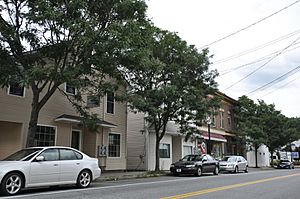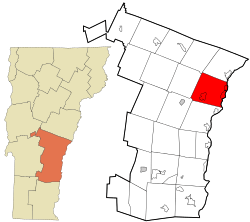Hartford, Vermont facts for kids
Hartford is a town in Windsor County, Vermont, United States. It's located right on the border with New Hampshire. This town is special because two major highways, Interstate 89 and Interstate 91, meet here. Also, three rivers flow through Hartford: the White River, the Connecticut River, and the Ottauquechee River.
Hartford is made up of five smaller communities, or villages: Hartford, Quechee, West Hartford, White River Junction, and Wilder. In 2020, about 10,686 people lived here.
Quick facts for kids
Hartford, Vermont
|
|
|---|---|
 |
|

Location in Windsor County and the state of Vermont.
|
|
| Country | United States |
| State | Vermont |
| County | Windsor |
| Chartered | 1761 |
| Communities |
|
| Area | |
| • Total | 45.9 sq mi (118.9 km2) |
| • Land | 45.0 sq mi (116.5 km2) |
| • Water | 0.9 sq mi (2.3 km2) |
| Elevation | 761 ft (232 m) |
| Population | |
| • Total | 10,686 |
| • Density | 232.77/sq mi (89.87/km2) |
| Time zone | UTC−5 (Eastern (EST)) |
| • Summer (DST) | UTC−4 (EDT) |
| ZIP Codes |
05001, 05009 (White River Junction)
05047 (Hartford PO box) 05059 (Quechee) 05084 (West Hartford) 05088 (Wilder) |
| Area code(s) | 802 |
| FIPS code | 50-32275 |
| GNIS feature ID | 1462116 |
Contents
Hartford's Early History
The town of Hartford was officially created in 1761. It was chartered by Governor Benning Wentworth of New Hampshire. The town was named after Hartford, Connecticut.
In 1887, a serious train accident happened near Hartford. A train hit a broken rail on a bridge. This caused the train to fall into the frozen river below. It was a very sad event for Vermont.
Where is Hartford Located?
Hartford is located at these coordinates: 43°39′52″N 72°23′12″W / 43.66444°N 72.38667°W.
The town covers a total area of about 118.9 square kilometers (45.9 square miles). Most of this area is land, about 116.5 square kilometers (45.0 square miles). The rest, about 2.3 square kilometers (0.9 square miles), is water. The famous Appalachian Trail also passes through the northwest part of the town, near West Hartford.
Hartford's Population Over Time
| Historical population | |||
|---|---|---|---|
| Census | Pop. | %± | |
| 1790 | 988 | — | |
| 1800 | 1,494 | 51.2% | |
| 1810 | 1,881 | 25.9% | |
| 1820 | 2,010 | 6.9% | |
| 1830 | 2,044 | 1.7% | |
| 1840 | 2,194 | 7.3% | |
| 1850 | 2,159 | −1.6% | |
| 1860 | 2,396 | 11.0% | |
| 1870 | 2,480 | 3.5% | |
| 1880 | 2,954 | 19.1% | |
| 1890 | 3,740 | 26.6% | |
| 1900 | 3,817 | 2.1% | |
| 1910 | 4,197 | 10.0% | |
| 1920 | 4,739 | 12.9% | |
| 1930 | 4,888 | 3.1% | |
| 1940 | 4,978 | 1.8% | |
| 1950 | 5,827 | 17.1% | |
| 1960 | 6,355 | 9.1% | |
| 1970 | 6,477 | 1.9% | |
| 1980 | 7,963 | 22.9% | |
| 1990 | 9,404 | 18.1% | |
| 2000 | 10,367 | 10.2% | |
| 2010 | 9,952 | −4.0% | |
| 2020 | 10,686 | 7.4% | |
| U.S. Decennial Census | |||
In 2000, there were 10,367 people living in Hartford. These people lived in 4,509 homes. About 28.7% of these homes had children under 18 living there.
The average age of people in Hartford in 2000 was 40 years old. About 23.4% of the population was under 18. About 14.7% of the population was 65 or older.
Famous People from Hartford
Many interesting people have come from Hartford, Vermont. Here are a few:
- John L. Bacon – A banker and treasurer for the state of Vermont.
- Marion L. Bugbee – A doctor, a supporter of women's right to vote, and a hospital leader.
- Daniel A. Dickinson – A judge on the Minnesota Supreme Court.
- Albert R. Hall – A politician in Minnesota and Wisconsin.
- Phillips Lord – A radio producer and actor in movies.
- Frank G. Mahady – A lawyer and judge who served on the Vermont Supreme Court.
- Samuel E. Pingree – He was the 40th Governor of Vermont.
- Charles W. Porter – He served as the Secretary of State of Vermont.
- William Strong – A U.S. congressman.
- Andrew Tracy – Another U.S. congressman who lived from 1797 to 1868.
- Joseph Tracy – An important person in the American Colonization Society.
- Horace Wells – A dentist who helped discover how to use anesthesia.
See also
 In Spanish: Hartford (Vermont) para niños
In Spanish: Hartford (Vermont) para niños


